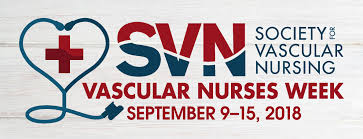This week’s Vascular Nurses Week (September 9-15) recognizes the important role vascular nurses play in the health of patients with vascular conditions or disease.
Requiring a broad skill set, vascular nurses care for patients in their home setting or can assist in surgical procedures. Their specific expertise is required for anything ranging from varicose vein surgery to amputation procedures to cardiac stent placement. In the course of a day they can care for those with leg ulcers or those suffering from peripheral artery disease. Their treatment and care can range from education about vein health. They educate about lifestyle factors that can improve it to helping patients and their families understand infection prevention and control.
Vascular nurses work as part of a team to care for patients, so communication, collaboration, and attention to detail are essential skills for them to have. Because they might work in emergency situations, they must have excellent critical thinking skills. Those will help them quickly assess what’s going on and determine how they can help.
To provide the best possible nursing care and to follow the highest of standards in care, obtaining a certification is an excellent career move. Offered through the American Nurses Credentialing Center, the cardiac/vascular certification is valid for five years and offers an excellent way to advance your knowledge.
Because vascular nurses see patients for a variety of conditions, they gain experience on how other conditions add to the complexity of patients’ vascular care and treatment. Diabetes and heart disease are a big influence on vascular health as are lifestyle choices like diet, exercise, and smoking. Being overweight can also have an effect on the proper function of vascular systems.
Vascular nurses are tasked with providing patients with educational materials about preventing the development or worsening of vascular disease, but also how to care for themselves if it has developed. Given that vascular disease cuts across all demographics and locations, vascular nurses encounter many cultures and attitudes that are closely entwined with the very things that impact health. Knowing the cultures and habits of populations served is important. By having cultural competency, nurses will be able to help develop care plans that will work with the patient’s beliefs and traditions and therefore, be effective.
With this partnership approach, nurses have the opportunity to develop close relationships with their patients and see the positive impacts of their care. Many vascular diseases are painful and being able to see improvement in a patient’s comfort is rewarding and inspiring.
If you think vascular nursing is a good career match for you, check out the Society for Vascular Nursing to find out more about joining a professional network or learning more about training and education.
- A Camp Nurse Volunteer Shares the Joy - April 30, 2024
- Is the FNP Program Right for You? - April 24, 2024
- WOC Nurses Week Highlights Specialty - April 16, 2024



